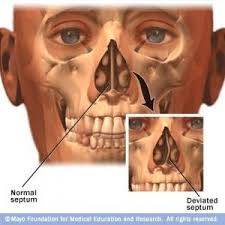Diviated Septum

A deviated septum occurs when the thin wall (nasal septum) between your nasal passages is displaced to one side. In many people, the nasal septum is off-center — or deviated — making one nasal passage smaller.
Symptoms & Causes
When a deviated septum is severe, it can block one side of your nose and reduce airflow, causing difficulty breathing. The additional exposure of a deviated septum to the drying effect of airflow through the nose may sometimes contribute to crusting or bleeding in certain people.
A nasal blockage or congestion (obstruction) can occur from a deviated nasal septum, from swelling of the tissues lining the nose or from both.
Diagnosis & Treatment
Treatment of nasal obstruction may include medications to reduce the swelling or nasal dilators that help open the nasal passages. You'll need surgery to correct a deviated septum.
